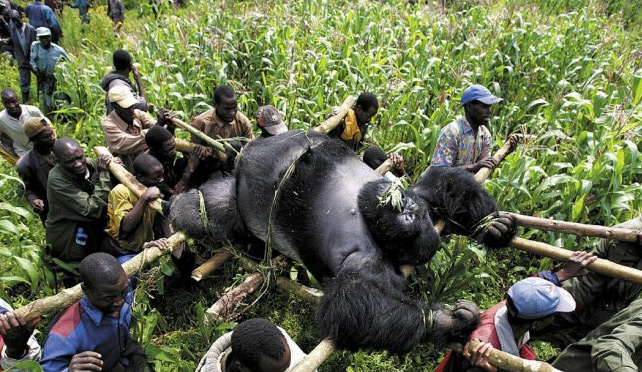Predators of Mountain Gorillas
Predators of Mountain Gorillas: Each mountain gorilla national park attracts approximately 10,000 tourists annually, making mountain gorillas some of the most sought-after species in East Africa. Individuals visit numerous mountain gorilla parks to observe and interact with the captivating gorillas. These primates inhabit highland rainforests.
Mountain gorillas inhabit the natural environments of three countries: Uganda, Rwanda, and the Democratic Republic of the Congo. The numerous mountain gorilla parks in these nations provide year-round trekking chances for mountain gorillas.
Volcanoes National Park, Virunga National Park, Bwindi Impenetrable National Park, and Mgahinga National Park are the designated habitats for mountain gorillas in Rwanda, the Democratic Republic of the Congo, and Uganda, respectively.
Mountain gorillas and humans share approximately 98% of their DNA. These primates engage in social interactions akin to those of humans and possess the ability to perform practically all human activities.

Mountain gorillas are classed as endangered due to their limited population relative to other wild mammals. Consequently, extensive initiatives have been undertaken to safeguard the remaining gorillas and establish habitats conducive to their proliferation and population growth.
Programs aimed at eradicating mountain gorilla predators by all viable means constitute one of various conservation projects; nevertheless, what or who are the predators of mountain gorillas? We offer insight into the predators of mountain gorillas.
Mountain gorillas are believed to have no natural predators for several reasons, including the following:
Mountain gorillas inhabit high-altitude woods that are less favorable for the survival of most other wildlife, especially potential predators. This safeguards the mountain gorillas from predation.
Due to their size, hunting mountain gorillas necessitates a larger, more formidable predator, as these primates average 400 pounds in weight.
Their social existence: Mountain gorillas are social animals that inhabit groups of no fewer than fifteen individuals. The silverback that leads the troop also functions as the group’s constant guardian. Predators encounter challenges in preying on mountain gorillas due to their social structure; nevertheless, an individual that deviates from the group may be easily targeted and killed.
Adult mountain gorillas engage in ferocious combat, striking and trampling their adversary until death or near-fatality ensues. Other wildlife in their natural habitat regard the mountain gorilla with trepidation due to its formidable combat techniques.
Nonetheless, leopards are the most probable natural predator of mountain gorillas. Unlike most of the big five or other formidable animals, the leopard is a robust feline that is notably elusive. It may assault a solitary mountain gorilla and conceal itself in the jungle. Wildlife research indicate that leopards hunt juvenile mountain gorillas that are abandoned. It is essential to note that leopards infrequently prey on adult or silverback mountain gorillas; rather, they focus on the young, as the latter possess the ability to defend themselves and maybe kill the leopard.
Nonetheless, people constitute the primary predator of mountain gorillas. The primary threat to mountain gorillas is people, who poach them for many reasons, including bushmeat, spiritual significance, cultural trophies, and occasionally as retribution for the gorillas’ eating of human crops or intrusion into gardens. Poaching may also transpire when individuals seek to utilize a segment of the gorilla’s habitat for agriculture or habitation.
The illicit hunting of mountain gorillas has significantly contributed to the reduction of their populations in the wild, making the prevention of poaching a foremost objective for all conservation efforts.
Participating in a mountain gorilla trekking excursion in one of the three countries is a means to assist these conservation efforts. Mountain gorilla trekking permits are priced at $1500 in Rwanda, $800 in Uganda, and $400 in the Democratic Republic of the Congo.
